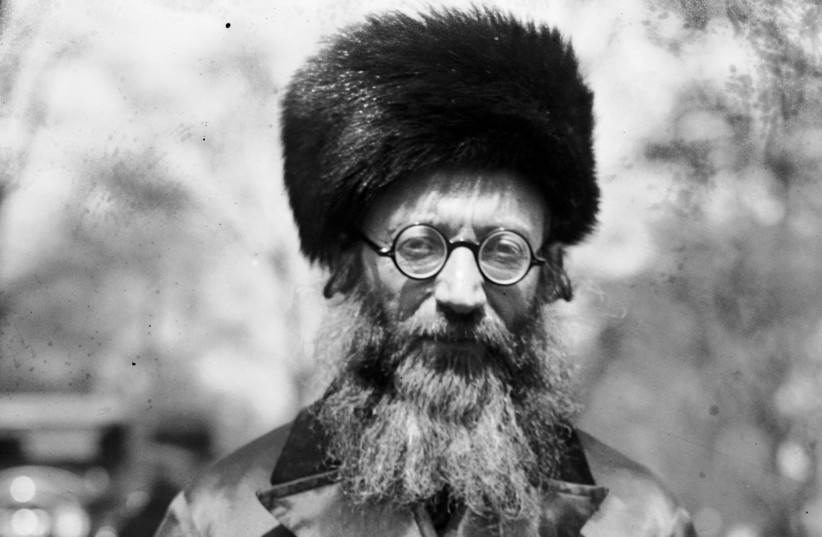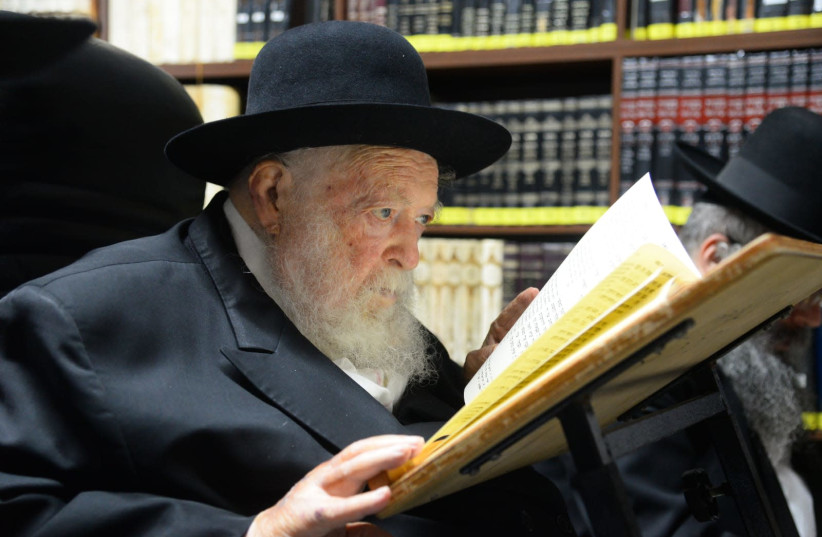Are rabbis no longer influential Jews?
What is missing is a cadre of rabbinic leaders with universal vision, towering souls whose very presence inspires and motivates us to better ourselves.

WHERE ARE the rabbis – the Rav Kooks (pictured), the Aryeh Levines?
Well, the (Jewish) New Year has come and gone, and with it all kinds of quaint customs (most of them of the culinary type).
The
most famous of these, of course, is the tradition of New Year’s
resolutions – what I promise to do, what I promise not to do.
Must
confess, I’m not a big fan. In fact, the only New Year’s resolution I
make, year in and year out, is not to make any New Year’s resolutions.
Because, let’s face it, you soon won’t remember them, and even if you
do, they’re bound to be broken. I prefer the rabbinic advice to avoid
vows, pledges, promises and promissory notes.
And
then there are the lists: Your Top 10 favorite movies of the year, your
most (or least) memorable dates (yes, happily married people also can
go out on dates!) and, sad to say, the list of old friends, celebrities
or athletes who have died since last Rosh Hashanah.
The Jerusalem Post has its annual list, too, the “50 Most Influential Jews,”
subtitled “our brightest stars.” This year’s selection included a slew
of politicians, medical personnel (thanks, COVID!), various and sundry
mega-business leaders both male and female, army higher-ups, a judge, an
oligarch, organization heads and major philanthropists, a couple of TV
stars and Israel’s two Olympic gold-medal winners.

Rabbi Chaim Kanievsky, one of the most senior ultra-Orthodox rabbis in the country
All
deserving, I’m sure. But what’s glaringly missing from this august
collection of movers and shakers? The rabbis! Only one clergy-person, a
female Reform rabbi from France, made the grade – and she just barely,
in the very last spot on the list. In a Jewish world and a Jewish
country teeming with rabbi-types – as the old saying goes, “you throw a
stick in Israel and you’ll hit either a dog or a rabbi” – these folks
are incredibly conspicuous by their absence. In this glossy book of
“brightest stars,” they barely produce a twinkle.
It’s
perplexing: we have yeshiva heads by the hundreds, synagogue rabbis on
almost every corner, kashrut specialists, ritual circumcisers – they
really don’t appreciate not making the cut! – chief rabbis, municipal
rabbis, rabbi educators galore, rebbetzins and more, but they couldn’t
crack the top 50.
What’s wrong with this picture?!
Now, your first reaction may be to blame the Post;
maybe it has something against rabbis, so it just plain left them out.
After all, rabbis have gotten a ton of bad publicity this year, what
with them screaming like banshees at the Knesset, waffling on COVID
regulations and running off to Uman while so many thoughtful others
stayed safely at home. But the folks here at the paper don’t seem to be
biased against the order of the ordained; they even let a mild-mannered
rabbi write in the Magazine on a regular basis.
Could
it be that there are no deserving rabbis out there? Not a chance. There
are legions of talented, caring, erudite, charismatic rabbis throughout
the Jewish world. We read their books and divrei Torah, we enjoy –
generally – their sermons, we eat confidently from their food
supervision and we call them with any and every halachic question. So
why in God’s name (pun intended) aren’t they on the list?
I
WANT to humbly suggest that maybe, just maybe, it is time to put our
pride on hold for a moment, stifle our egos, contain our tempers and
take a long, hard look at what we rabbis are accomplishing on a grand
scale.
Yes, we are
doing commendable work, God’s work, and, by and large, have strong
moral values – midot, we call them – and a commendable commitment to our
communities.
But – are we changing the world? After all, we are meant
to be spiritual leaders who inspire, guide, motivate and direct the
Jewish people to a place of glory, beacons of light that illuminate a
dark planet and move all humanity closer to the Creator.
Where
are the rabbis who will courageously address the problems of aguna,
mamzer, child molestation and battered women? And solve the conversion
crisis?
Where are
the rabbis who will stand up and tell world Jewry, in no uncertain
terms, that its place is here – and only here – in the Holy Land of
Israel? Who will unabashedly proclaim that millions of our
coreligionists are squandering the momentous opportunity with which we
have been Divinely blessed, that they are spurning the blessing we
pleaded and prayed for throughout the millennia?
Where
are the rabbis – the Rav Kooks, the Heschels, the Aryeh Levines, the
Jonathan Sackses – who were selfless role models, in word and deed, for
anyone and everyone, not just their partisan followers?
What
is missing is a cadre of rabbinic leaders with universal vision,
towering souls whose very presence inspires and motivates us to better
ourselves. Rabbis who are not interested in their own
self-aggrandizement; who don’t use the words “I” and “me” profusely,
shamelessly tooting their own shofar and their supposed accomplishments
rather than looking to heighten the holiness of the others around them.
The talent is there, the brains and training are there, but their
dominating presence on the world stage is not.
Maybe,
after all, they’re not the only ones who need musar, chastisement.
Maybe we, too, have to look inward and share part of the blame. If, as
they say, society gets the leaders they deserve, then we need to step
up, too. We need to be more demanding about the scholars and theologians
we put up on the pedestal, refusing to settle for just anyone or
anything but the very best.
It’s
a tall order, but as the world becomes more complex, more dangerous,
more demanding, more difficult, those who strive to be closest to God
need to take their game to a new level. They need to raise people up
while simultaneously bringing the Almighty down to meet them.
At the very least, let’s try to break into the Top 10 of next year’s list.

1) The Post's criteria for influential ignores Torah and mitzvos observance. In order to make the list, a "rabbi" would have to excel in social justice, woke culture, and the like. Imagine a rabbi putting out an important set of books on Jewish faith and law. It wouldn't register with them because they ascribe no value to it.
ReplyDelete2) The leadership of the Chareidi community is in "Ghetto Mode" - instead of seeing that the world has changed, that God has favoured His people and given us our Land back, they work to create a community that looks back at the ghetto as the ideal. The leadership in the Religious Zionist community is confused and disorganized. There is no central set of values or principles. On one side you have the Chardal. On the other side are the Open Orthodox. It's an empty vessel that anyone can pour something into. So no hope there.
Forget the JP - Where are the rabbis is the real question?
ReplyDeleteWell that's my (2). The Chareidi rabbis are too busy trying to keep their self-built ghettos from slipping through their fingers. Adjusting and maximizing the opportunity of Israel and modernity is beyond them. The DL rabbis are too busy trying to figure out what DL is and how to stop people from leaving to come up with any grand plans.
ReplyDeleteNo disagreement at all. Add the new twist - the DL are trying to keep their flock from from becoming charedi!
ReplyDeleteEven the great Lichtenstein/Amital duo could not agree on the DL hashkafa.
ReplyDeleteWell that's the problem with DL - unlike Chareidism with its all-inclusive ideology that covers everything, DL has only one fundamental principle - Israel is God's gift to us. That makes it hard to be exclusive and keep people looking for more clarity in the fold.
ReplyDeleteThe reason there are no rabbis on the list, really, is because a good rabbi tells people "no" and Woke religion demands that God approve of anything we want.